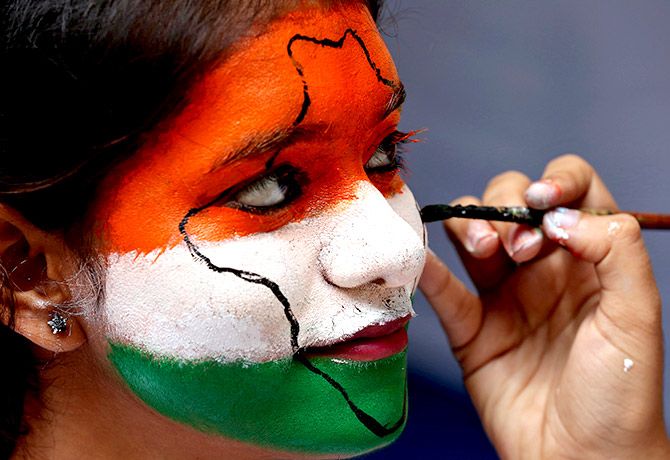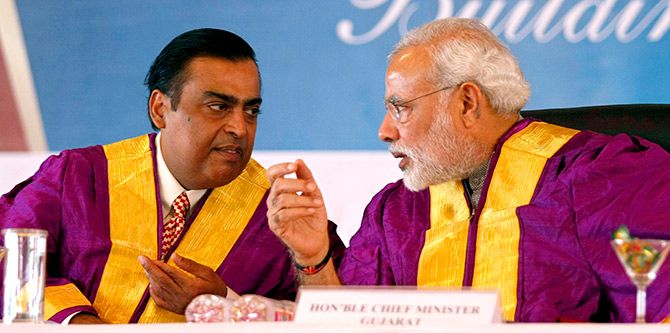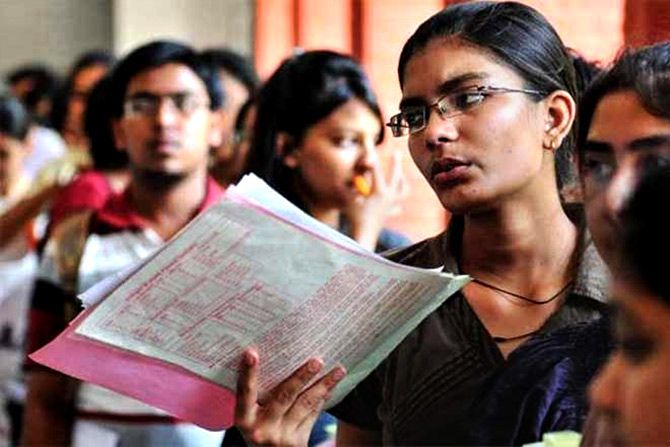'Everything will be decided by the Centre.'
'Universities will have no autonomy to start a new course or introduce a new syllabus.'

The ministry of human resources recently came up with a draft of the Higher Education Commission of India Act 2018 to replace the University Grants Commission Act.
But many educationists like Professor M Ananthakrishnan, former vice-chancellor, Anna University, and former chairman, IIT-Kanpur, are strongly against the new Act.
"Higher education in India will be controlled by a single agency at the Centre. After Independence, it was believed that higher education will flourish as an intellectual enterprise in the country, independent of bureaucracy and other controls. All that will be gone now," Professor Ananthakrishnan tells Rediff.com's Shobha Warrier.
Will replacing the University Grants Commission with the Higher Education Commission of India be a cosmetic change or do you see a lot of changes happening if the new Act is implemented?
No, it is not just a change of name; it has deeper implications.
What the government is planning is going to be quite significant for higher education in the country.
Will it be good or bad?
It is bad because the powers the states have over higher education will be taken away by the new Act.
Until 1976, education used to be a state subject as per our Constitution. In 1976, with the 42nd Amendment, it became a concurrent subject.
What this government wants to do is to take away the concurrent status and make higher education a central subject.

Some educationists feel the new Act will result in centralising and bureaucratising higher education.
I will tell you in what way.
Nobody will be able to establish a private or public university like they are able to do now.
If the Act is implemented, you will have to get permission from the central government.
Not only can the state not start an institution, but without permission from the central government, they can't even start a new course.
Also, all institutions including those supported by the Centre will have to now disclose everything about the courses, plans, etc.
Any falsification will attract a jail term and even closure of the institution.
The bill proposes an advisory council chaired by the HRD minister, with representatives from state councils of higher education.
This body will meet once in six months to identify issues for co-ordination and, in case of any disagreement, the central government's decision will be final.
That means the central government is taking over all the functions relating to higher education. So, from being a concurrent subject, higher education will now be totally under the Centre.
Does that mean the states will not be able to take a decision even about the syllabus?
Yes. Everything will be decided by the Centre.
The universities will no longer have the autonomy to start a new course or introduce a new syllabus.
Another issue is that the Higher Education Commission will have the authority to give degree-granting powers to colleges if they satisfy certain conditions. Today, only universities can give degrees.
Just imagine, today we have 40,000 colleges in India and even if half of them satisfy the conditions, the proliferation of degrees in India will become enormous.

Today, we hear everyone complaining about the quality of students that come out of Indian universities. Do you feel that, with colleges granting degrees, it will deteriorate further?
Yes, the quality will go down even further.
Then comes the question of giving grants to the universities.
The UGC was the regulatory and funding body, giving grants to both central and state institutions and, in some cases, to some private institutions too.
With the new bill, funding has been removed from the purview of the Higher Education Commission.
How are the universities going to get funds?
On July 23, there were many questions in Parliament about what happens to the funding of universities once the Higher Education Commission comes to existence.
The HRD minister said there would be a concurrent body called the Higher Education Funding Agency to give funds to universities. This will be a non-banking financial institution that will raise about Rs 10,000 crores (Rs 100 billion) from banks, the private sector and corporate bodies.
The catch is, this body will provide funds to universities as loans and not as grants like the UGC used to do. This loan has to be paid back by the institution.
Are universities supposed to raise money only through fees?
This aspect is not very clear. They don't talk about how the institutions are supposed to raise the money.
Also, the loan amount can only be used for development purposes like building a stadium or a library and not to pay salaries.
While the principal amount will be repaid by the institution, the interest will be borne by the central government.
Here, too, there is a hitch.
The state universities will not be able to avail this loan unless they get the permission of their state government.
The state governments may not easily give the permission as they will have to repay the loan in case the universities fail to do so.
This means the state universities will not benefit from HEFA.
So, eventually, there is going to be a regulatory body called the Higher Education Commission of India and a funding body called the Higher Education Funding Agency.
Unnecessarily, a lot of confusion has been created.
The HECI's governing body will consist of bureaucrats, not educationists. That is why we feel higher education will be bureaucratised.

why does the government want to abolish the UGC when it has been functioning quite well?
The UGC was functioning as an autonomous, independent body. It does not bow down to the dictates of the central government as it functions by a Parliamentary Act.
They could not control the UGC the way they wanted to, so they wanted a body that would obey their wishes.
Do you feel the government is trying to hijack higher education in India?
Exactly. The autonomy of all universities will be totally gone with the new Act.
With the private sector and corporate bodies as members in the HEFA, do you feel there would be more cooperation between academia and industry?
What will happen is that the corporate players in the funding agency will dictate which university will get the loan and which university will not.
In other words, the interests of the private agencies will play a role in the funding of higher education.
In what way will this affect the higher education scene in India?
Higher education in India will be controlled by a single agency at the Centre.
After Independence, it was believed that higher education will flourish as an intellectual enterprise in the country, independent of bureaucracy and other controls.
All that will be gone now.

Doesn't this bill need approval in Parliament?
Of course, Parliament will have to pass the bill. I hope it will not.
So far, the state governments have not reacted to the bill.
Only the chief minister of Tamil Nadu has written a letter to the prime minister that the UGC should not be abolished.
Do you feel no debate is happening in the country?
No debate. No pressure.
I think the state governments have not realised the implications of the bill.
They have not understood that an invasion of the central government into the powers of state government will happen with this bill.
As an academician, what is in your mind?
I hope by the time it comes to Parliament, there will be more awareness in the country.
My feeling is that it will not become an Act.












 © 2025
© 2025